You will find many if you look around the web for real estate matchmaking or referral companies that combine short-term financing to facilitate real estate transactions via cash offers and transaction management.
And one of the larger ones is HomeLight.
Short-term financing providers with cash offers have popped up recently due to low inventory and rising housing prices in the U.S.
So, potential buyers don’t have to resort to picking up a suitcase with money, kissing someone’s ring, and maybe opening a casino in Ozark anymore (too much Netflix, I know).
In this article, I will take a closer look at HomeLight, and you will learn…
…what HomeLight is and what it does
…about HomeLight’s business model
…how the company works for agents
…whether HomeLight is legit and owned by Google
…whether it is a tech company
…if HomeLight buys homes
…how to get leads and referrals from HomeLight
…what the company’s simple sales and cash offers do
…about HomeLight’s closing services and listing management
…about the referral fees and commissions
…about the differences between HomeLight and Zillow, Opendoor, Flyhomes, Orchard, Ribbon, Redfin, and Ideal Agent
…how accurate is the home value estimator
…about the HomeLight customer reviews
…and the overall pros and cons
So, as you can see, it’s a longer article, and I invite you to read it.
What Is HomeLight Real Estate, and What Does It Do?
Like Zillow, HomeLight is a real estate platform for buyers, sellers, and agents.
HomeLight’s mission is to return the control of real estate transactions to the consumer.
It’s a multi-sided real estate platform for sellers, buyers, and agents. And for each of these groups, they offer several solutions.
For sellers, the platform features a search to find the right seller agent, a home value estimator, guides on how to sell your home, and more solutions to help the home selling process.
Buyers can find the right agent, get pre-approved, use different calculators (e.g., home affordability calculator), and find information about housing trends.
Finally, real estate agents can get seller or buyer leads by getting found via the platform by clients and other agents.
Or, as HomeLight calls it, “getting referred.”
So, for agents, it’s rather a matchmaker platform.
Additionally, it offers different transaction supporting services for agents, such as “Trade-In,” “Cash Offer,” and closing services.
According to this video from 2019, HomeLight had over one million agents and more than 40 Million transactions in its database.
HomeLight’s Business Model – How Does It Make Money?
Most of the platform usage is free, so you may wonder how HomeLight makes its money.
While the seller-buyer agent matchmaking is free and done mostly automatically via their platform, the main money is made via the transaction that follows this matchmaking.
So, once a real estate agent closes a deal and receives a commission, a referral fee of 25% of their gross commission must be paid to HomeLight.
The 25% referral fee refers to properties up to $4 million. If an agent closes a property for more than $4 million, the referral fee is 30%. (source)
In a sense, you could consider HomeLight an online brokerage with additional features serving buyers, sellers, and agents.
How Does HomeLight Work for Agents?
The main benefit of using HomeLight as a real estate agent is to get buyer or seller leads.
You can get real estate leads without upfront costs since you only pay ten days after closing.
So again, it acts as a broker.
The matching or referral process that agents can benefit from works in several steps.
How Buyers Are Matched with Agents
The process for buyers to be matched with an agent goes the following way.
A buyer goes to the search field in the buyer section and types in the area where they are looking for properties.
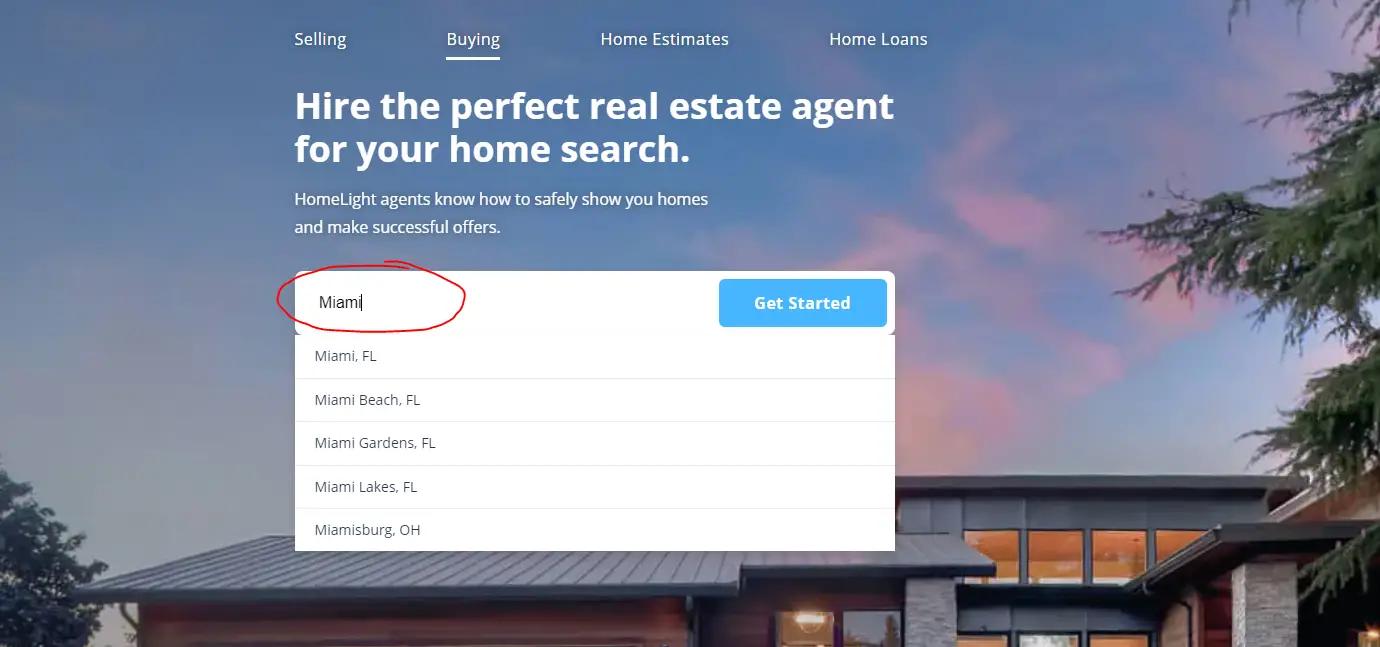
The platform then asks additional questions about where the buyer is in the process.
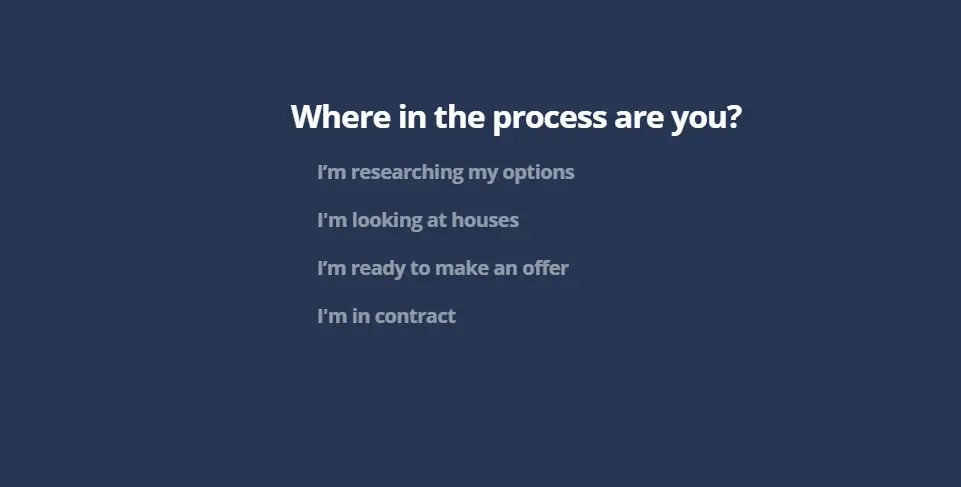
The next question is about the type of property the buyer wants.

Then, additionally, the web application will ask the potential buyer whether they are already pre-approved by a lender.
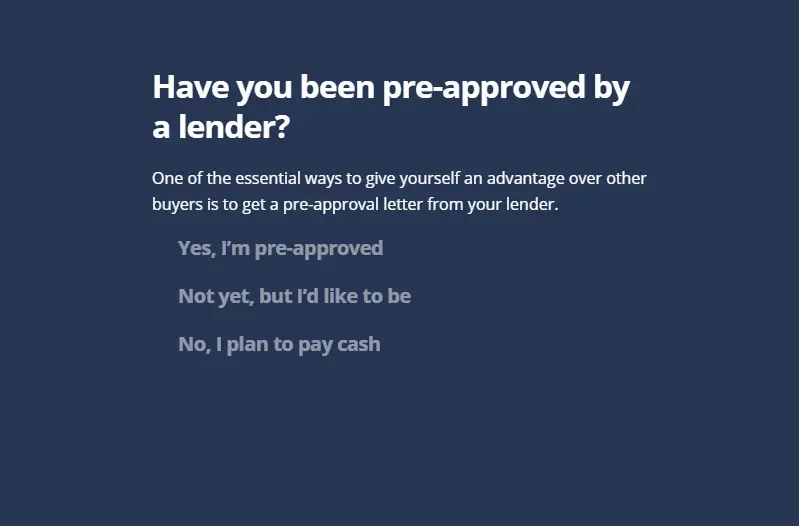
As a next step, the buyer is asked whether they are already working with a realtor.
At this point, it is mentioned that HomeLight has already rated the top-performing agents in the desired location.

You can see it’s a lot of questions, and as the next question, the system asks the potential buyer when they plan to buy, their price range, and how the home will be used.


The next question is also smart, considering buyers can often be sellers and vice versa.
So, here it is asked whether the buyer is also looking to sell a home.

One of the last things the potential buyer has to do is fill out a short form with basic contact information (name and email address), not a phone number (I guess to reduce friction).
But the phone number will be asked in the next question, the last before the agent matches will be displayed.
Here, the potential buyer also consents by clicking on “Generate Matches” that they will be contacted via different means of communication (e.g., auto-dialed phone calls and text messages and prerecorded messages on the landline or cell number).

While that many questions will reduce the conversion rate for HomeLight, it will definitely increase the quality of the buyer lead that can be generated.
How Sellers Are Matched with Agents
For a seller to get matched with a real estate agent, HomeLight will also ask several questions, starting with entering the respective property address.
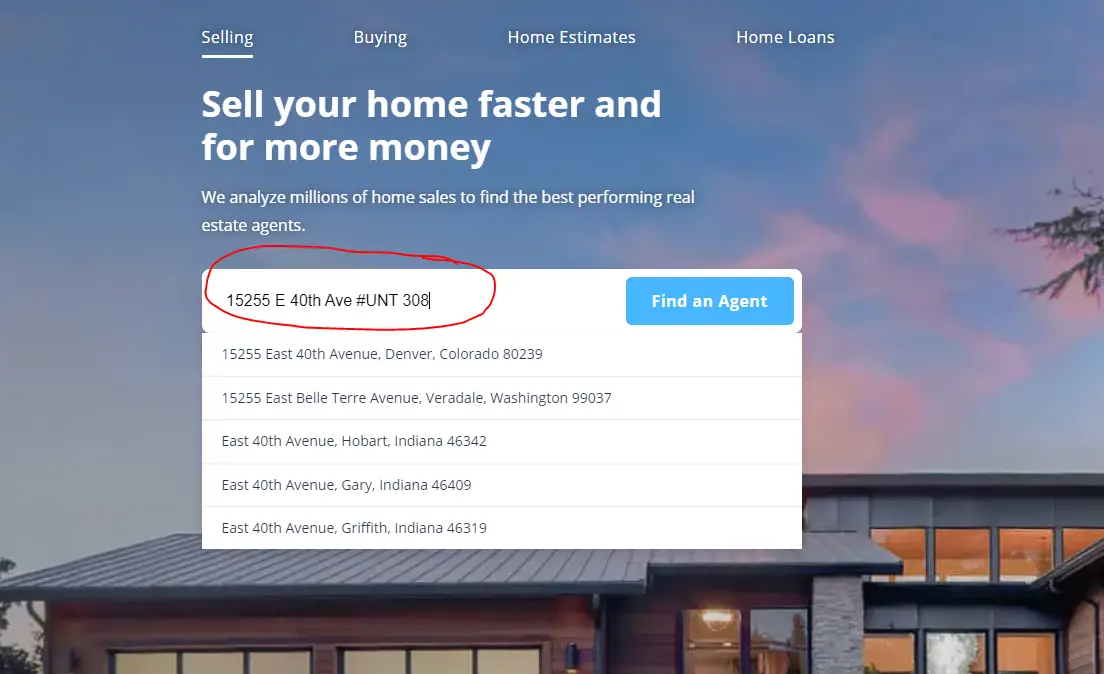
You will then have to confirm that the indicated address is correct and will be asked to add a unit number if you forget it.
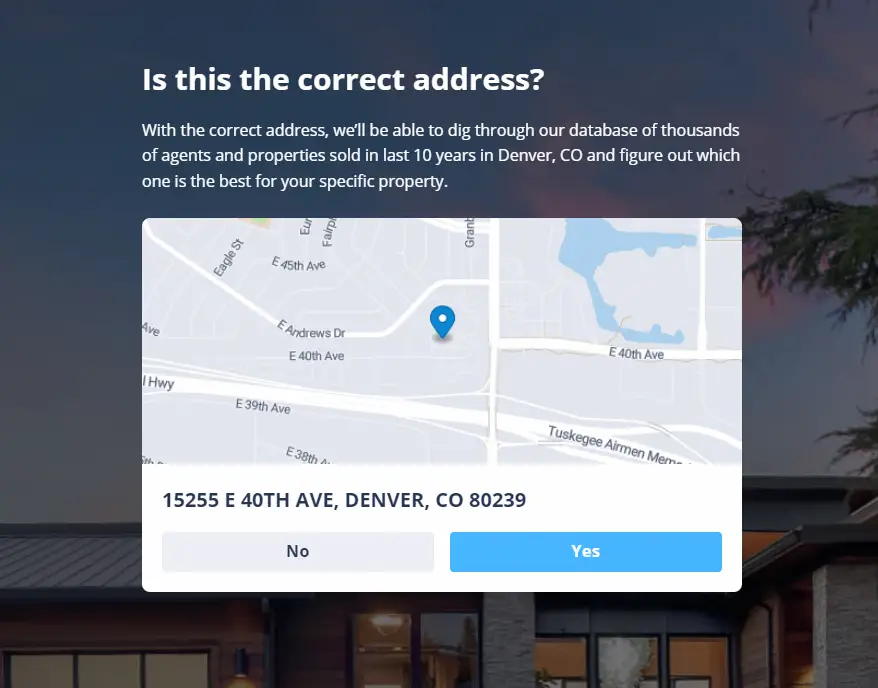
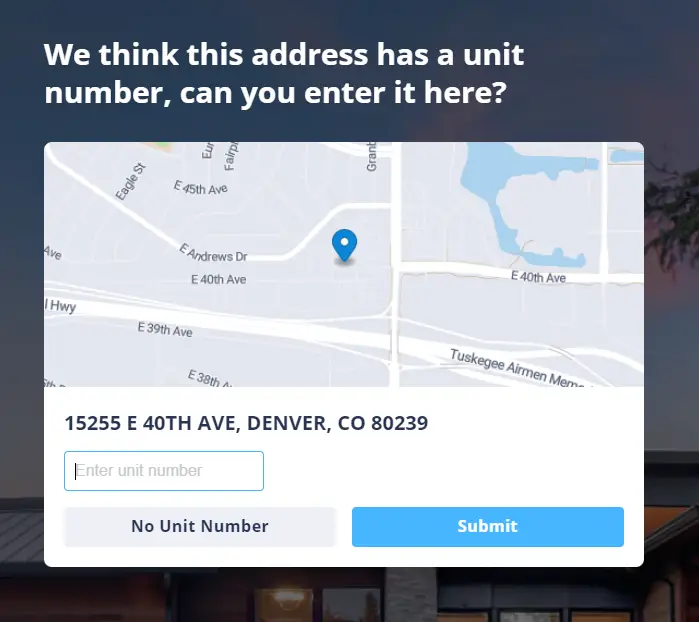
After entering this information, you will be asked how much the property is worth.
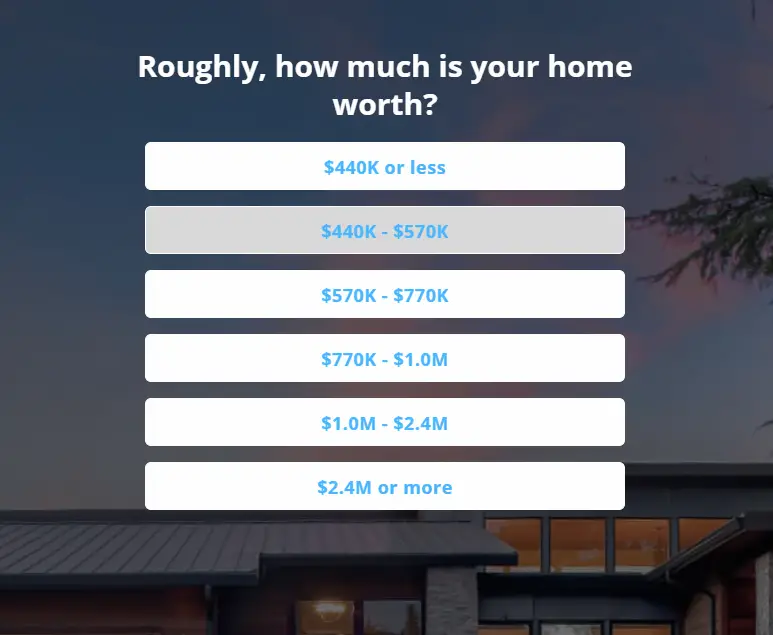
The next question is about when the seller wants to sell. Real estate agents that best match the information given so far are displayed on the right side.
But you can’t do anything with this information unless all information is shared.
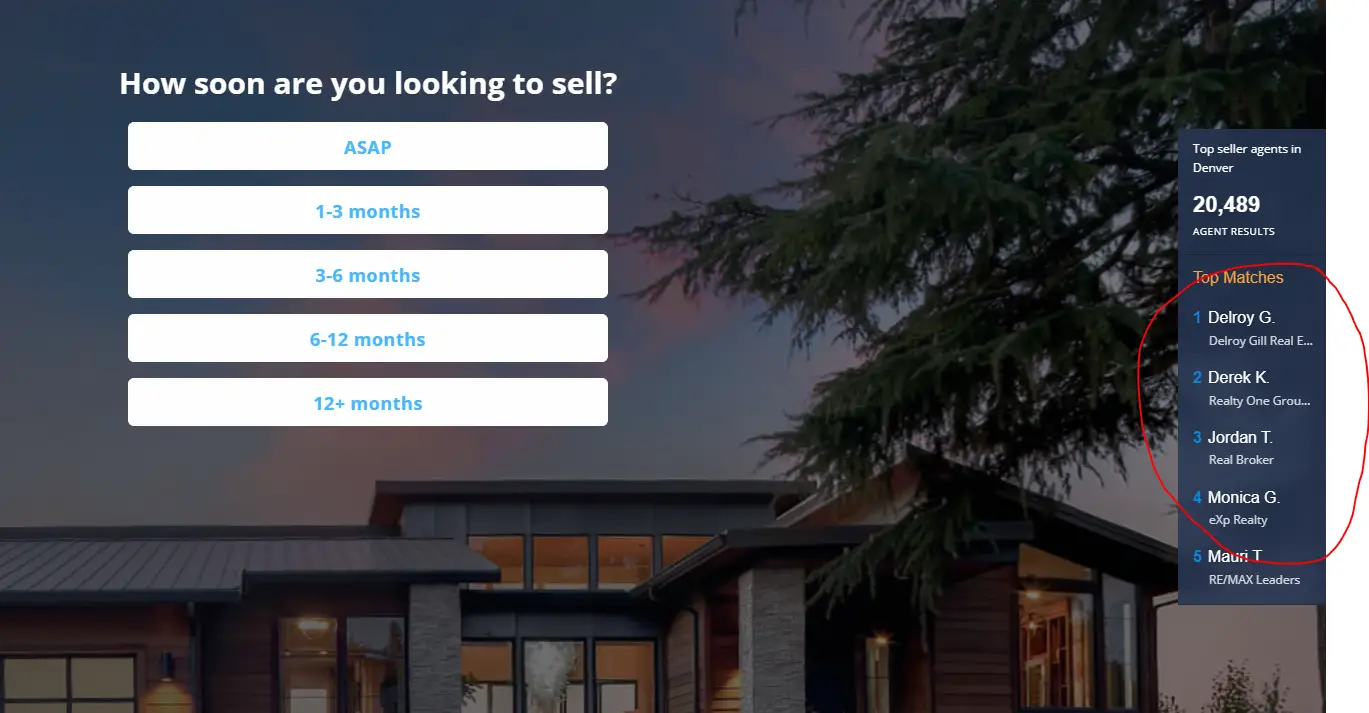
And again, similar to the question for buyers, the seller gets asked if they are also considering buying.
Again, this is an intelligent question since real estate lines are blurry when it comes to a person being a seller or buyer, and frequently they can be both.
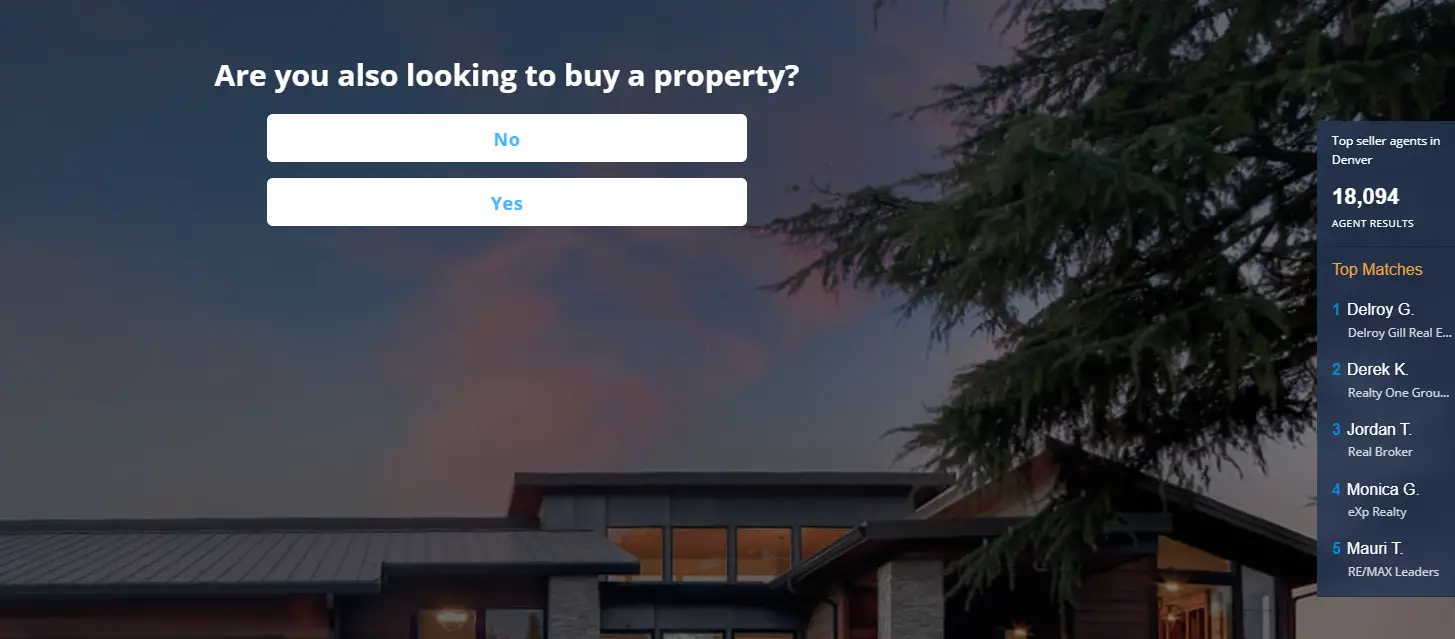
After that, HomeLight asks the seller how they heard about the platform.
I assume this is to track their different marketing channels regarding conversion rates.
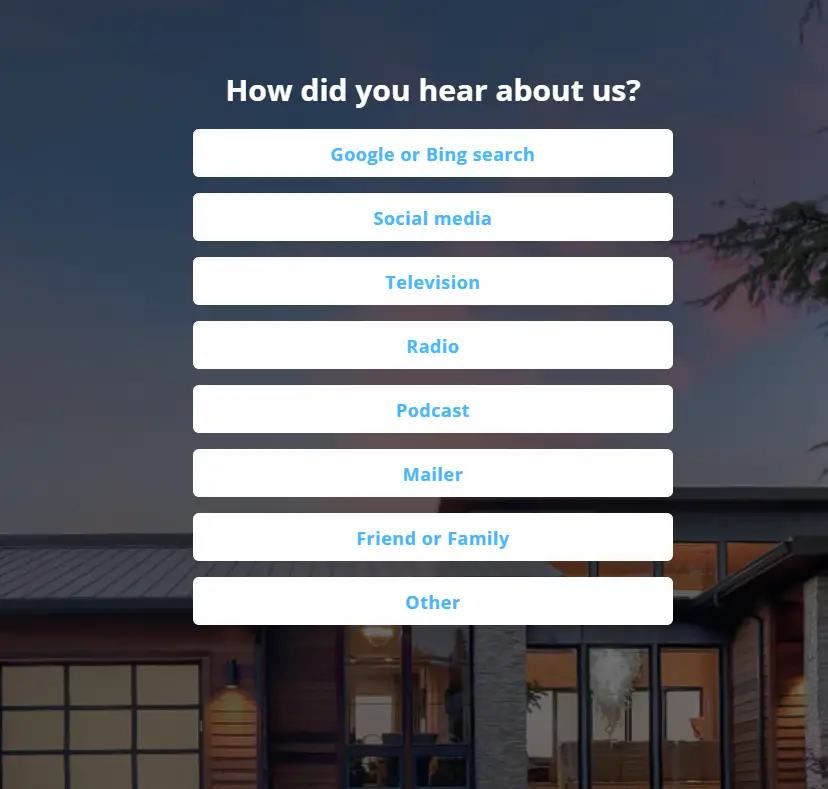
And finally, the seller will have to enter their full name, which should be it.
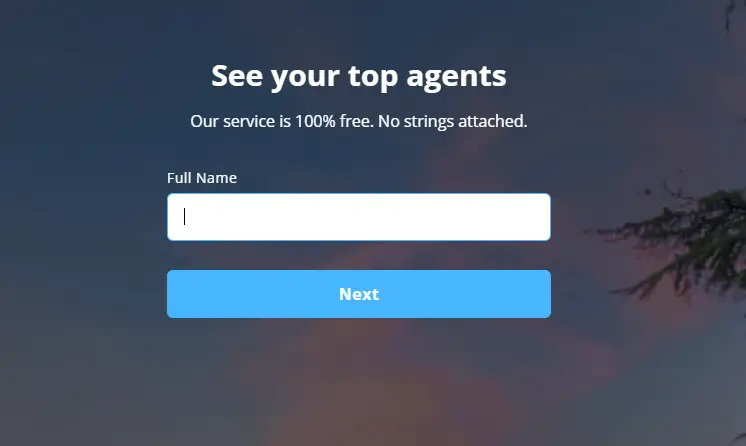
No, it’s not the last information.
Again, HomeLight made it two steps between name and entering phone numbers.
So, in this step, the seller must enter the email address and phone number.
By clicking on “Generate Matches,” they agree again to be contacted via different communication means.
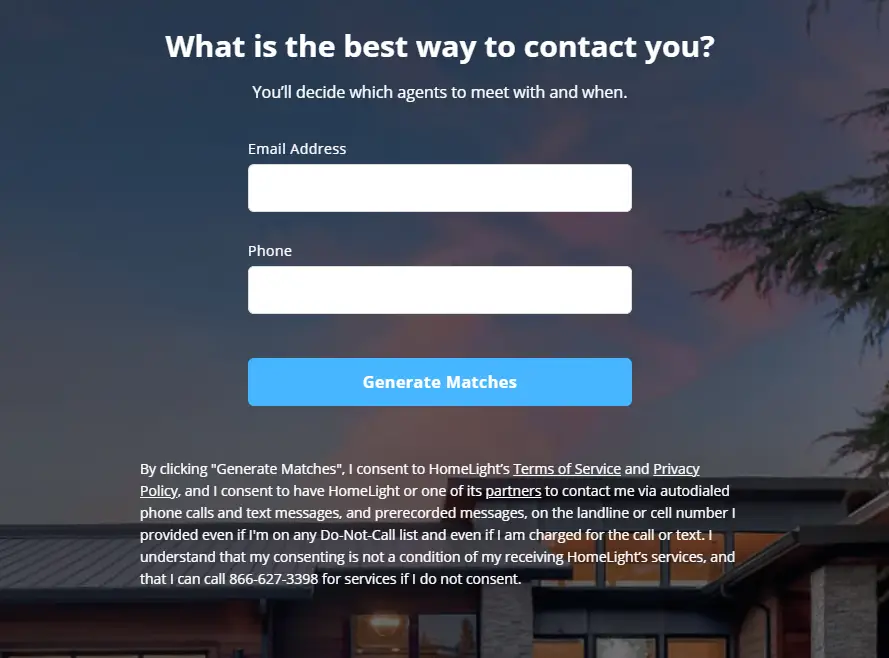
So, overall, in both cases, HomeLight does a lot of pre-qualification work. This suggests that agents working for HomeLight will likely get higher-quality leads.
When this first seller and buyer application process is ended, the relevant agents that match will be notified via an email blast.
The real estate agent can then accept or reject the seller or buyer.
If they accept, the next step is an interview to see if the buyer or seller client fits with the agent.
The final step is signing an agreement.
Is HomeLight Legitimate?
HomeLight has a A+ rating with the Better Business Bureau and has been in business for 11 years. (source)
So, you can confidently assume that it is a legitimate business.
The main headquarters are located in San Francisco, California, and since its foundation in 2012, it has listed over $3 billion in homes and raised over $200 million in funding. (source)
Drew Uher founded it.
Does Google Own HomeLight?
HomeLight is not owned by Google, although the initial investment came from a venture capitalist firm called Google Ventures.
It is now called GV and has operated independently from Google since 2015. (source)
So, since HomeLight was founded in 2012, there may have been three years that it was owned by Google up to the moment it started to operate independently.
Google Ventures focuses on investments in tech startup companies and provides seed, growth, and venture-stage funding.
Many investment companies are involved in HomeLight, such as Zeev Ventures, Menlo Ventures, Stereo Capital, Crosslink Capital, and Group 11.
The last investment they could secure was in 2019 for $160 million. (source)
Is HomeLight a Tech Company?
HomeLight can be considered a tech company.
It even received the Timm Award in 2020 for being the best tech startup in San Francisco. (source)
At first glance, you could consider it a standard brokerage company, and indeed, it also needs to be licensed as one. It holds a real estate brokerage license. (source)
But the platform’s primary focus is the matching feature to connect sellers and buyers with real estate agents automatically supported by technology. (source)
Does HomeLight Buy Homes? The Trade-In Program
HomeLight buys homes via the “Trade-In” program. But the company doesn’t act as a buy-and-hold investor and is more like a wholesaler.
How so?
When you have a buyer client who still has to sell their home before they can buy a new one, HomeLight can step in and buy your client’s home at a cash price.
Once bought from HomeLight, the company starts working with a real estate agent in the respective area to sell it at full value.
Should this sale result in a higher price than HomeLight paid to your buyer client, they pay the price difference.
As you will soon see, when diving a bit deeper into the process, you may rather consider this sort of a bridge loan.
So, HomeLight’s intention is not to buy houses all over the place but to facilitate a real estate transaction that otherwise couldn’t have happened.
And this is how the “Trade-In” Process works. (source).
1) Week 1:
- Application for HomeLight loans
- Meeting with HomeLight
- Pre-approval
- Inspection
- Review of final numbers
- The signing of the Trade-In agreement
- The buyer client can start making offers
2) Week 2-3:
- Accepted offer on buyer client’s new home
- Creation of a listing plan
- Contract signed
- Buyer client can prepare relocation
3) Week 4:
- HomeLight closes (new home) and transfers funds
- Property insurance is transferred
- The client closes on the new home
- You get hired as a realtor to sell the buyer client’s old home
4) Week 5-6:
- The buyer client moves out
- The old home is vacated and is now ready to be prepared for market
- Listing work completed
- Home staging and photographs taken
- The property listing of the buyer client’s old home is live
5) Week 7+:
- Offer on the buyer client’s old home accepted
- The buyer client gets profit provided there is a difference in the prices
How to Get Leads and Referrals from HomeLight
First and foremost, you get leads from HomeLight when you are a registered agent with the platform.
HomeLight uses an algorithm to make a match between sellers/ buyers and real estate agents.
This matchmaking algorithm checks a database of over 30 million transactions, several million agents, and 200,000 brokerages specialized in the real estate transaction that is most suitable to the one the respective seller or buyer is looking for.
My research resulted in no further detailed information about what type of performance data they are analyzing, so I couldn’t find an angle on how you may influence the system to improve your lead generation with HomeLight.
The only information I could find is that they use objective agent performance data, seller’s and buyer’s inputs and individual needs, and local real estate market conditions.
Once a match is made, two to four agents receive the client’s contact information.
So you have a 25% to 50% chance of converting the lead they provide into a client or customer.
While a bit basic, the below video from HomeLight gives a little overview.
HomeLight Simple Sale and Cash Offer – What It Is and How It Works
HomeLight’s Simple Sale program features a nationwide database of pre-approved buyers and investors who can buy homes.
It is basically a variation of the earlier mentioned “Trade-In” program.
In this case, it is more addressed to sellers, and HomeLight can offer them a cash offer to buy their home.
It compares the cash offer amount with the property listing retail prices, enabling the seller to compare if they would prefer to alternatively list their home.
In this context, HomeLight can also suggest real estate agents in the seller’s neighborhood based on their ratings so they may have more information to decide to sell for cash to HomeLight or work and list with a realtor.
So, again, HomeLight acts as a matchmaker in this scenario but combines this with the option to buy a home directly via a cash offer.
As a seller agent, you still maintain the opportunity to earn a full commission in the case of a conclusive transaction.
HomeLight may suggest you as a seller agent if the seller doesn’t want to sell via a cash offer.
The company buys a house in cash, and a seller agent can start selling the property HomeLight bought in cash.
Here, you can find out more about the SimpleSale program.
HomeLight Closing Services
HomeLight Closing Service can be found under the separate domain homelightclosingservices.com/ and could be called a branch of HomeLight.
At the time of this writing, it is only available in eight states: Arizona, California, Colorado, Florida, Illinois, Michigan, Texas, and Washington.
The closing service is a bit like paid professional parents (not sure if they exist) who patiently handle kids on a trip while they constantly ask, “are we there yet?”.
So, HomeLight’s closing service platform can be used to share all necessary closing documents and messages, all digitally encrypted.
Closing documents can be submitted and reviewed in a few minutes, and the involved parties are updated instantly about the state of their transaction and what is happening with the funds involved.
The process is guided by closing professionals that are available 24/7.
Some documents can be signed online, and others can be coordinated to be signed via a mobile notary at the location of the seller’s or buyer’s convenience.
HomeLight Listing Management
HomeLight’s Listing Management Tool stems from a friendly take-over, or for a better word, acquisition of a tool called disclosure.io.
It ties into and supports the previously mentioned closing services.
It has four core components consisting of several features: manage offers & closing services, form filling and document management, private/public listing information packages, and detailed buyer interest reports.
1) Manage Offers & Closing Services Features
These features support HomeLight’s closing services and enable the involved parties in a real estate transaction to receive all offers in one safe location online.
Offers are automatically organized into a dashboard comparing the terms. You can share this dashboard with the seller client.
So, the documents will be accessible anytime, and the system also notifies everyone involved about the transaction’s status.
2) Form Filling and Document Management Features
This feature allows you to split large PDF files into smaller files, redact private info, and/or reorder pages.
It helps create a shareable public or private listing information package with interested buyer clients.
Another feature in this component is the disclosure doc form filling for a disclosure already in use.
This is tailored to seller disclosures, limits agent liability, and avoids seller mistakes.
3) Private/Public Listing Information Packages
With this component of features, you can create property listing information packages that are trackable so you can see whether it was viewed or not.
You can also determine who has access to it.
Overall, it is a team collaboration feature to facilitate the work of different stakeholders in a transaction, such as assistants, realtors, brokers, and coordinators.
4) Detailed Buyer Interest Reports
This component provides you with features related to further tracking of listing information packages.
What reports are generated?
It reports which document was opened, read, and/or what percentage of the buyer party read each document.
This report can also be shared with the seller client.
Additionally, the whole viewership activity can be downloaded, and you can get notifications about the activity in real-time.
What Are HomeLight’s Referral Fees & Commissions?
HomeLight has a straightforward referral fee and commission structure for real estate agents using their tools and services.
However, understanding their referral agreement can be confusing, so I created a table that better illustrates the different cases and the referral fees and commissions triggered.
| Case | What Happens? |
|---|---|
| A transaction closes within two years of the date of the referral. | Referral fee isf 25% of total gross commission. |
| Agent represents both a buyer and seller on the same transaction and one party is an Homelight referral. | Referral fee is 25% of 50% of the total gross commission. |
| Agent represents buyer and seller on the same transacion, and both parties are Homelight referrals. | Referral fee isf 25% of total gross commission. |
HomeLight vs. Zillow
As I mentioned at the beginning of this article, HomeLight has several similarities to Zillow.
It is also a real estate platform for buyers, sellers, and agents.
However, when you look at their business models, you will learn that Zillow’s focus is selling advertising space to real estate pros, such as brokers and realtors.
In contrast, HomeLight doesn’t do that since they make money via the different referrals from real estate transactions facilitated by their various tools and services.
On the other hand, Zillow likely has more data on homes in their database, namely 110 million, according to this source.
If we believe Similarweb, HomeLight had 1.4 million page views in May 2022, whereas Zillow had 311.2 million page views (source).
So, based on the traffic difference, we can assume that Zillow is still by far a larger platform than HomeLight, and you may have more exposure should you advertise on that platform.
But on the other hand, you would also have more competition since Zillow doesn’t use methods like HomeLight to vet realtors, suggesting only those with a good track record to potential sellers or buyers.
HomeLight vs. Opendoor
One significant difference between HomeLight and Opendoor is that the first is a matchmaker, and the second strongly focuses on buying homes from property owners via a bidding system.
Once a bid is won, Opendoor buys the property and charges a fee similar to the amount a realtor would charge.
So, they can be considered a buy, fix, and flip platform at scale.
Unless a real estate agent isn’t a direct seller or owner herself, they aren’t even part of the company’s equation, so there is not much value regarding the seller or buyer lead generation here.
It is most suitable for owners or sellers who need to sell their homes quickly.
After purchasing a home, Opendoor makes necessary repairs and relists them for sale.
Here, you can learn more about Opendoor.
HomeLight vs. Flyhomes
Imagine several employees working at HomeLight suddenly coming together and rebelling against the headquarters.
What could be the main reason?
Of course, the espresso machine strikes every morning at the same time.
Let’s suppose they then form their own company doing almost the same as HomeLight with the slight difference that they would pay real estate agents a salary and some bonus based on the number of homes the new company could buy with their help.
This business could then be called “Flyhomes.”
Why?
Because that’s what Flyhomes mainly does, and what they offer to sellers and buyers is similar to HomeLight.
Still, one difference is that Flyhomes charges commissions directly from buyers and sellers, and agents work for them as employees.
Another difference is that the company also offers mortgage and title insurance, but unlike HomeLight, they don’t offer closing services and a matchmaking algorithm between sellers/buyers and realtors.
You can check out Flyhomes here.
HomeLight vs. Orchard
Orchard has more similarities with Flyhomes than with HomeLight.
But one main difference between Orchard and HomeLight is that they offer two options instead of one regarding trade-ins.
The first option for a buyer who needs to sell before buying a new home is that with Orchard’s help, they can access instant equity from the current home for a down payment for the new house.
The second option is the cash-backed offer, where Orchard pays entirely for the buyer’s new home.
Again, unlike HomeLight, Orchard doesn’t offer closing services supported by real estate transaction tools and not the buyer/seller – realtor matchmaking functionality.
Here, you can learn more about Orchard.
HomeLight vs. Ribbon
While HomeLight’s core feature is more the matchmaking between realtors and sellers and/or buyers, Ribbon focuses more on facilitating real estate transactions by offering buyers different ways of purchasing a new home when the funding is not yet accessible.
In that way, it is similar to the other competitors, such as Orchard and Flyhomes.
The company also provides “buy before you sell” programs, facilitating cash offers and closing rescues (again, a cash injection to allow a buyer to bid higher).
On the other hand, sellers are invited to accept cash offers facilitated by Ribbon.
What Ribbon doesn’t offer, but what HomeLight does, is again the listing management and closing services.
You can check out Ribbon here.
HomeLight vs. Redfin
The differences between HomeLight and Redfin are more readily visible than with other providers.
So, when I previously compared the ingredients of a cheeseburger with other cheeseburgers, we can now compare a cheeseburger with a chicken burger.
While concerning real estate agents, HomeLight is a matchmaker and closing facilitator, and Redfin is a full-fledged online brokerage with its own agents.
They don’t inject cash directly to make a real estate transaction possible but can help buyers find lenders and inspectors.
So, they take on more of an assisting role in facilitating a transaction.
Unlike HomeLight, Redfin also has rental properties and is more involved in marketing (e.g., email marketing).
In my article where I compared Redfin with Zillow, I mentioned that their commission structure is a bit difficult to understand.
So, working as an agent with HomeLight is a bit easier regarding referral fees and the commission structure, and you will likely earn a slightly higher commission.
Here, you can learn more about Redfin.
HomeLight vs. Ideal Agent
Ideal Agent’s main difference from HomeLight is that the company positions itself a bit more like a matchmaker between top-performing real estate agents and sellers/buyers, but also as a company that helps sellers and buyers save money on commissions.
Instead of an algorithm that finds the right seller or buyer agent on demand, they work a bit more on an exclusive only-by-invitation basis.
Only agents in the top 1%, closing at least 50 transactions in 12 months in a small market or 100 in a large market, are invited to work with Ideal Agent.
Agents also need at least five years of real estate experience, at least 25 reviews, and a 4.9-star rating on Zillow or Realtor.com.
Unlike HomeLight, they don’t provide closing services and listing management.
But since Ideal Agent just recently introduced a cash offer program, they come now closest to being a direct competitor with HomeLight as ever (source).
You can check out Ideal Agent here.
How Accurate is the HomeLight Home Value Estimator?
The HomeLight home value estimator can be considered reasonably accurate and slightly more accurate than Zillow’s Zestimate.
This is provided they did what they announced in 2017 and aimed to lower this error rate by adding additional calculations and comparing the estimates across five models (source).
Although not perfect, Zillow’s Zestimate is often considered the most accurate home value estimator tool.
Its national median error rate for on-market homes is 1.9%, and for off-market homes, 6.9% (for off-market homes) (source).
HomeLight Reviews
Researching and finding impartial user reviews for HomeLight was a bit like getting to a restaurant and asking the chef how the food is at the restaurant right across the street.
Roughly 80% of the sources available are indirect or direct competitors.
Nevertheless, I found some reasonably impartial, which you will find in the overview table below.
I selected the ones that didn’t seem overly emotional, both on the positive and negative sides of things.
| Positive Reviews | Negative Reviews |
|---|---|
| "Since there are so many realtors in South Florida, I used HomeLight to look for the right person who can sell my property quickly in my neighborhood. I contacted the top 3 agents recommended, which was very easy to see who represents which neighborhood, what price range they deal with, and their current selling history. I went with the first agent who contacted me, and was able to close my property in less than 2 months!" | "All this is is a site to collect YOUR information so that they could give it to annoying real estate people to call you to get a listing fee. Don't fall for it. They do not tell you property value like other sites freely without the need to divulge your personal history. Go to Trulia or Zillow for an easy price quote. Also, you can save THOUSANDS of dollars if you want to list your property yourself for a set fee and save the exorbitant listing agent 3% cost." |
| "As a first-time home-seller, I was looking for someone with the knowledge and patience to help me through the selling process. But sifting through all the potential realtors was overwhelming. HomeLight helped me narrow down the options and find someone with the expertise I was looking for. I received solid references and selected a realtor with the experience and demeanor that were a match for me." | "This review is about HomeLight Simple Sale product. Their team members can't agree on the process. Every person tells you something different about how it should work. They made an offer on my home and wanted me to sign the deed over to them and have it recorded a month before paying me for it! Then they changed their tune after I threatened to report their deceptive practices to the Department of Insurance. After that they decided to charge me closing fees and HOA docs fee on top of me giving them a 10% concession on the price. They do not put earnest money in escrow and they also use their in-house escrow so that they control whether you get paid or not. " |
| "I received a call within minutes after completing info. I was contacted by several realtors, but the first was Chris Benson and we decided to work with him (Mesa, AZ). It was the best experience we have ever had working with a realtor. He and his associate, Scott Baglien, were responsive to our questions/concerns and well-connected with a competent contractor. Our property was extremely well marketed. We were competently advised and not pressured to consider any offer not in our best interest." | "I selected a realtor based on the referrals of this company. Realtor was just mediocre. The home was listed for a very long time, and it finally sold, thanks to another different realtor, not referred by Homelight, who represented the buyer, and certainly no thanks to Homelight nor the realtor referred to me by Homelight. After the sale, Homelight sent me an email offering me a $20 Amazon gift card to write a review. I wrote a modestly positive review just to get the the gift card, meagre as it was. I never received the gift card and I continue to only receive more emails offering me an additional $20 for a BBB review." |
| "Homelight gave me 3 recommendations and all 3 were excellent realtors. It was very difficult to pick one to represent me for the sale of our house. All 3 were well qualified and all 3 were leaders in a very competitive market. The realtor we selected sold my house in 1 week. We had 3 offers. We then used the same realtor to purchase a new house and he was able to negotiate a much better deal than I could on the purchase of a new build. Thanks Homelight." | "Repeated spam to my email address asking me to review the broker of record for the firm I used to sell a house 4 years ago. At what point do these companies realize that incessant spamming is not an acceptable way to do business?" |
HomeLight has 3 out of 5 stars on Yelp and 4.5 out of 5 stars on Sitejabber.
Analyzing the reviews, I learned that you mostly find two extremes: either extremely positive or extremely negative.
What troubles me a bit is that several highly negative reviews mentioned that HomeLight allegedly incentivizes positive reviews with Amazon gift cards.
So, you may want to take the positive ones with a grain of salt.
But since most negative ones are on the extreme negative side, you may want to take these too with a grain of salt.
The best and most objective reviews I find are the ones in the middle range with three stars.
Most positive reviews I researched complimented HomeLight’s great matchmaking service to find the right real estate agent.
But there was no word about the trade-in service.
The negative ones had the basic tenor of HomeLight having an unstructured and confusing communication and an overly aggressive prospecting approach (e.g., robocalls and many emails).
HomeLight Competitors
Considering the “buy before you sell” program and other real estate transaction facilitating services and their realtor matchmaking, I could identify the following competitors.
To be included as a competitor, they had to offer realtor matchmaking and the financial part to facilitate a real estate transaction with cash offers.
So, here they are:
HomeLight Pros and Cons
I know this was one of those long articles, and I will end it here with a small pro and con overview table.
But unlike other pro and con overviews about HomeLight, this one is done with the realtor’s interests in mind.
| Pros | Cons |
|---|---|
| Agents don't have to reduce their commission and pay traditional referral fees. | Match making algorithm may still have room for improvement (based on negative reviews agent quality might be inconsistent). |
| Likely higher quality buyer and seller leads due to qualifying questions | Not much information about how the matchmaking algorithm works. |
| All cash offers facilitate real estate transactions | Compared to Zillow less traffic, but likely less competition |
| Free buyer and seller leads if you qualify and are matched. |
This article has been reviewed by our editorial team. It has been approved for publication in accordance with our editorial policy.
- Why Real Estate Conversion Rates Are 6-Times Below Average - March 21, 2024
- How to Manage Your Apartment Advertising Campaign - February 23, 2024
- Finding Marketing Channels for Apartment Advertising - February 12, 2024

